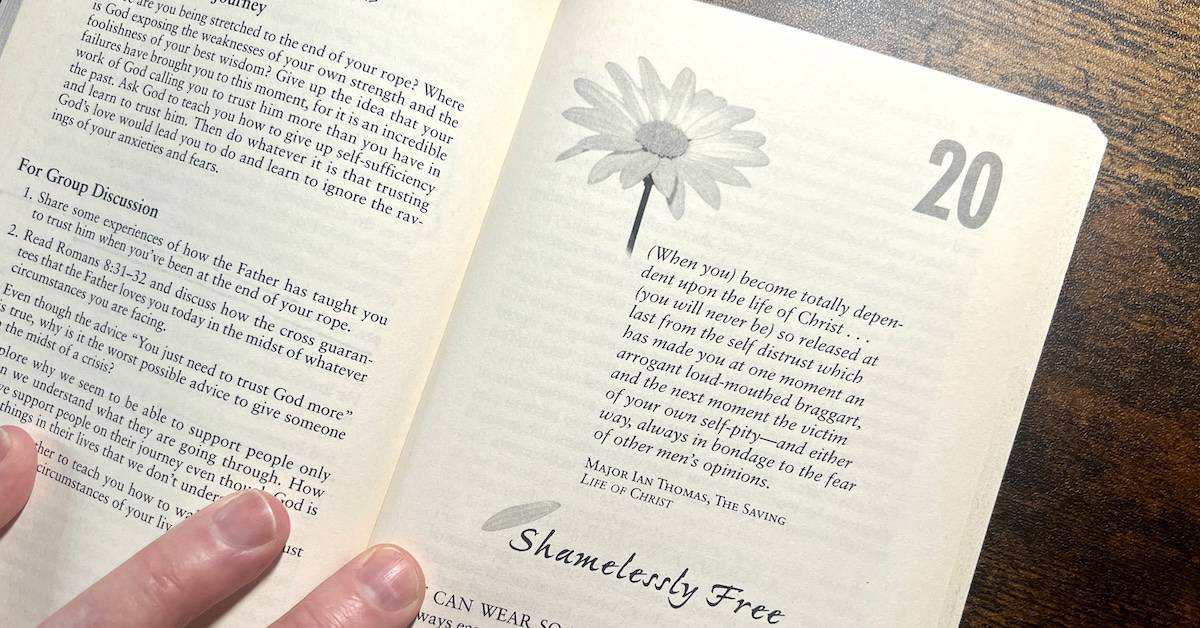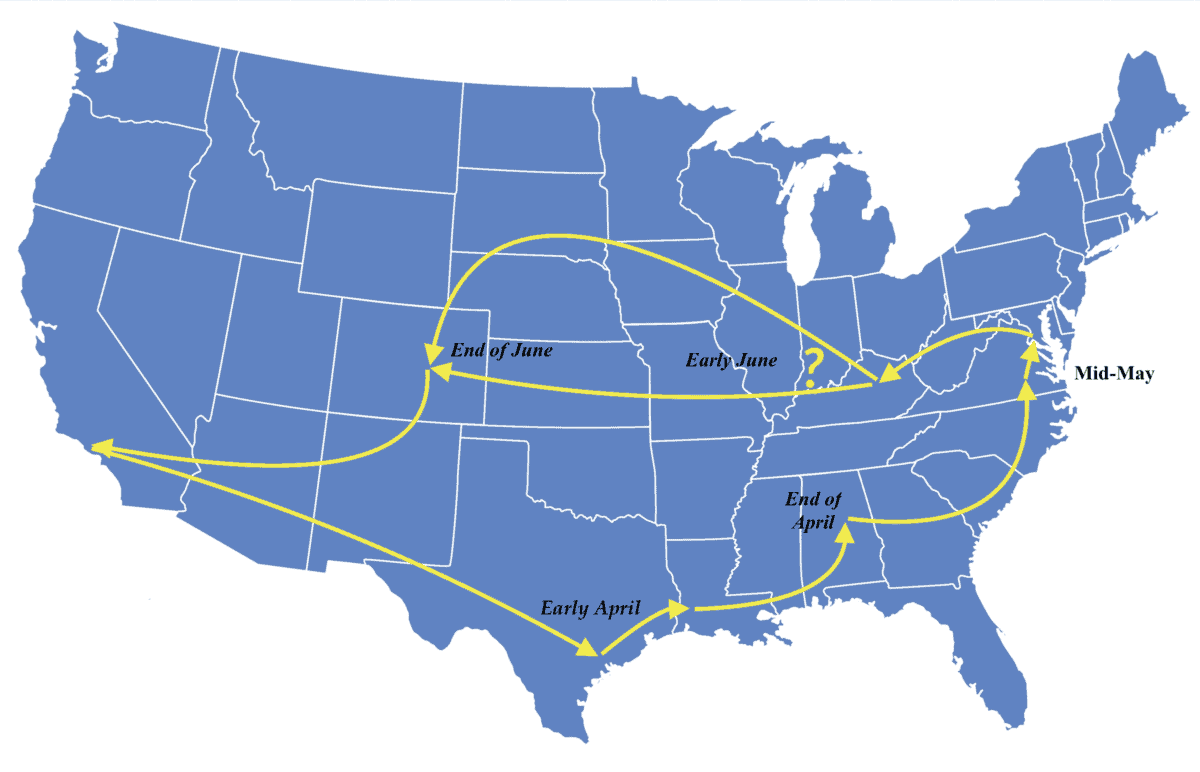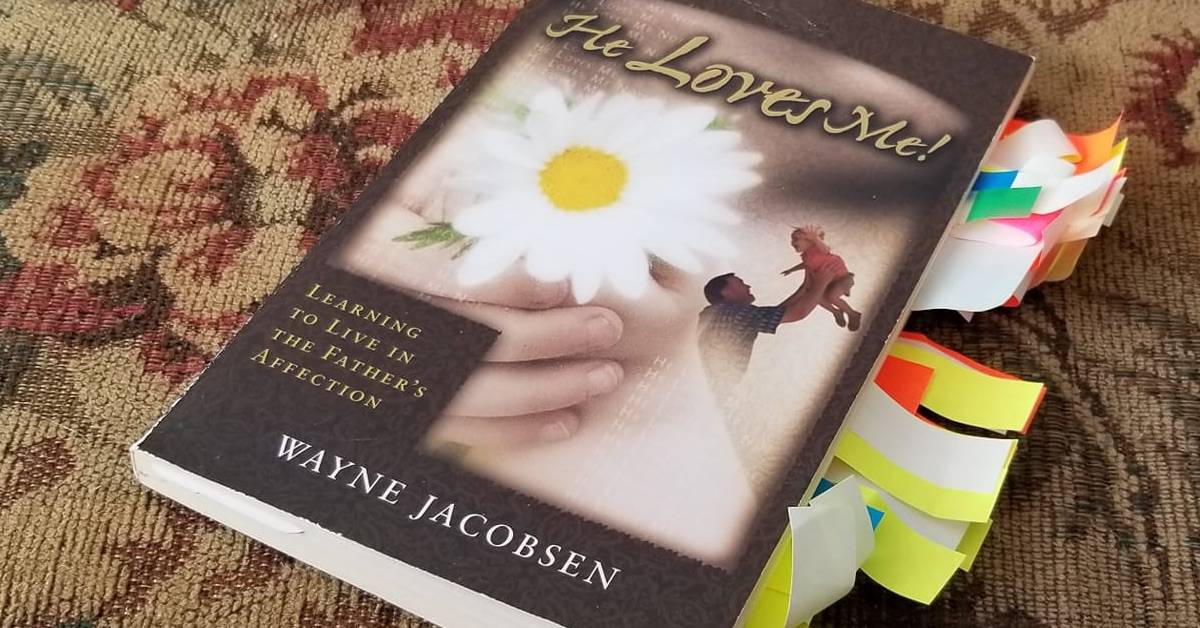Chapter 5: The Tender Call
Note: This is the fifth in a series of letters written for the Bride of Christ who are alive at the end of the age. Once complete, I’ll combine them into a book. You can start with Chapter 1 here. If you are not already subscribed to this blog and want to make sure you don’t miss any, you can add your name here.
________________
I’m not sure I know what you mean by the bride. Are you referring to Israel, as some suggest, or to the church, and if so which church? I want to be part of her, whoever and wherever she is, but I’ll admit that my spiritual hunger has been almost nonexistent lately. How can I make sure I’m included?
— Miguel, 34-year-old pharmaceutical representative in Alabama
Miguel,
I love your questions and I love that your heart yearns to be part of what God is doing to make her ready.
Jesus is calling her, a drawing across time and space to every human heart, awakening whatever passion there might be for Jesus and his presence with them. You sense it first in the heart even if you can’t recognize the source or know what exactly you’re feeling. Soon, new passions become more important to you than the dead ones that have preoccupied your attention without leading you to life. The bride is stirring, even out of great darkness and disillusionment—and she is everywhere!
Don’t worry about being left out, Miguel, it is not in God’s nature to do so for anyone who desires him. I taste that passion in your note to me.
So, who is this bride? There are differences of opinion on that question. In the Old Testament, Israel is often referred to as God’s bride, rescued out of great anguish and darkness and then invited into his light and joy. Restoring her to health and beauty, God takes her as his wife, the delight of his heart.
The metaphor of romance and marriage are often used to express not only the depth and closeness of the relationship God wanted with Israel, but also the festive joy and celebration that such a union would evoke. Sadly, as powerful and inviting as that might sound, Israel was never able to sustain that relationship for any significant length of time. Thus, she repeatedly fell back into the slavery of her own fears and appetites and became the adulteress woman, and God the forsaken husband.
The lure of promiscuous sex and the promised security of the false gods of the civilizations that surrounded them, tripped them up again and again. Instead of enjoying God they found these images overlapping as twisted expressions of sex were incorporated into their idol worship. She proved faithless to the one who was completely faithful to her, even though he always invited her to return to him where all would be forgiven.
In the New Testament two things shift inside this metaphor. First, the bride now includes the followers of Jesus in his Church where distinctions between Jew and Greek, and male and female no longer have meaning. Secondly, Jesus is specifically identified as the bridegroom, and all human history culminates in a marriage celebration between Jesus and his bride as all things are made new.
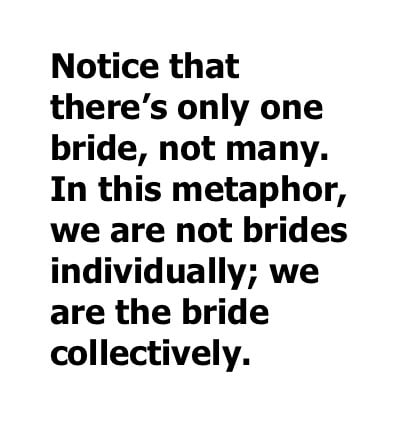 I see the bride as all of God’s people across time who embrace him as the lover of their souls and follow him with delight and joy. And notice that there’s only one bride, not many. In this metaphor, we are not brides individually; we are the bride collectively. It’s not just individual redemption he is after, but as the Spirit transforms us, he is also knitting together the hearts and minds of diverse people from every group on the planet. They will come to act as one, not because they are loyal to the same leadership structure but because they manifest his glory in the world and to the powers beyond it. (Ephesians 3:10-11)
I see the bride as all of God’s people across time who embrace him as the lover of their souls and follow him with delight and joy. And notice that there’s only one bride, not many. In this metaphor, we are not brides individually; we are the bride collectively. It’s not just individual redemption he is after, but as the Spirit transforms us, he is also knitting together the hearts and minds of diverse people from every group on the planet. They will come to act as one, not because they are loyal to the same leadership structure but because they manifest his glory in the world and to the powers beyond it. (Ephesians 3:10-11)
One of the joys of responding to his call is to recognize that same Spirit in others whose paths you cross. You’ll find an instant camaraderie with them, not because you believe all the same things, but because you recognize the nature of Jesus in them. They are easy people to be around, with an infectious spirit—graciously authentic, even in weakness, and tender with love and kindness.
So, where is that bride? She is scattered to the four corners of the earth. When I pray for his bride, I do not imagine a specific person or group of people. I don’t think of her as the religious institutions we call churches either, but as something far less defined by human convention. She is a living, breathing, entity that is being shaped even as you read this.
I’m not sure who comprises this bride, but Paul told us that the foundation of God’s work in the earth is that “The Lord knows those who are his.” (2 Timothy 2:19) I don’t even begin to try to figure out who they are. If he knows, I don’t have to and all our human attempts to define those who are in with God and those who are out are woefully misguided and horribly inaccurate. I find his people in all sorts of places.
Of course, I see her most easily among those who have allowed the Father’s love to shape their lives over multiple decades and through painful circumstances. In every generation, you will find people who have discovered such a depth of love inside of God that they have learned to follow him, often in conflict with their own self-interest, and it will often cost them dearly—reputation, position, money, friends, and family.
The bride does not flourish in environments of manipulation and conformity and thus, she will follow him outside of the conventional paths others demand. Thus, they are often rejected and lied about by those who find their unwavering loyalty to Jesus threatening to their attempts to control them. Though they are viewed with suspicion, their pain only invites them deeper into the love that heals all wounds.
Instead of becoming defensive or bitter, they are marked by tenderness and humility and a deep wisdom that easily admits that they haven’t figured everything out. They will point the way to him without taking his place by telling people what they should do. Since they find their joy in him, they are unconcerned about legacies or building a following, and are mostly unknown, often tucked away in hidden places where their strength and wisdom can be an encouragement to others in the last days.
If you want to be part of his bride, you are on a similar trajectory even if you don’t know it yet, or it has barely begun. The call to the bride is a tender, repeated invitation to draw near to the One who loves you and offers you his light and courage. No matter how many fits and starts you’ve had in that journey, his heart is always open to you.
To the uninformed, it may be a fascination with the transcendent. They have sensed his presence though they don’t know its source or may have misidentified it. Their heart is touched in ways they can’t explain but they taste his love and insights that will draw them, if they don’t get sidetracked by the wiles of darkness.
To those who have been crushed by the powers of darkness through extreme suffering or pain, it is often a deep but certain drawing into the warmth of his light and the safety of his love. My heart goes out to those of you who have been traumatized by abuse or abandonment or suffered through great loss or sickness that may have sapped your will to live.
The damage done to your soul may make it difficult to see him and thus, you may feel abandoned by Jesus. But he is right there with you; he always has been. You are his beloved even if everything in you argues to the contrary. Your pain is not his doing, and he has a path for healing and restoration that will overcome the darkness set on destroying you. When you find him in the midst of your pain, you’ll not only find your pathway to freedom, you’ll also be a gift to others who’ve endured similar pain.
For the religiously disillusioned, his call is an invitation back to first love—not how much you loved God but how free you felt inside his love at the beginning. Do you remember those early days before religious performance spoiled it? That’s not a blanket condemnation of those engaged in religious expressions, it’s simply a recognition that the routines of such systems often distract from him. If you find a meaningful engagement with Jesus in the rituals of your congregation, be grateful; many others have not. They continue the course in drudgery, hoping there is some salvation in the effort. Don’t blame Jesus or yourself for its failures, return to his love. Jesus is wanting to hold you again in his arms, caress you with his tenderness, and to show you that conformity to religious principles is not the path to the intimacy you seek.
To the religiously abused, whose hunger for Jesus was hijacked and exploited by insecure leader-types who saw your beauty and your gifts and wanted to use you to build their own kingdom, it’s a drawing of your spiritual eyes back to him. Even though your abusers claimed to do it in his name, they were not acting on his behalf. You became a cog in their vision, rather than a disciple ready to recognize and follow the voice of the Shepherd. You were so hungry for him, but it all came to such disappointment.
 You were born in freedom but raised in captivity under the lie that God wanted to use your works. No wonder things felt dead and lifeless. You came to believe things about him that were not worthy of him. He agonized over every lie you were told and now wants to rekindle your hunger and sate it with his genuine presence. He wants to love you into a way of living that will lead to his increasing glory finding a home in you. He is ready to fulfill those longings that ignited your heart as he teaches you how to walk in his love and listen to his voice.
You were born in freedom but raised in captivity under the lie that God wanted to use your works. No wonder things felt dead and lifeless. You came to believe things about him that were not worthy of him. He agonized over every lie you were told and now wants to rekindle your hunger and sate it with his genuine presence. He wants to love you into a way of living that will lead to his increasing glory finding a home in you. He is ready to fulfill those longings that ignited your heart as he teaches you how to walk in his love and listen to his voice.
To the wayward bride who lost track of the Jesus you once pursued when your passion was overrun by the worries of this life or the pursuit of wealth, his call is a drawing back to simpler times. You got so busy with work, responsibilities, and family activities, that he would have shared with you had you not forgotten him. The pleasure of the world’s amusements and the illusion of freedom quickly faded and now you keep busy to mask a growing sense of emptiness. Did I miss something back there?
Yes, you did, but though you may have lost sight of him, he has not lost sight of you. He has never done anything to harm or hurt you and is that voice in the back of your head inviting you to turn back to him. He knows that you will never be satisfied with anything less than a gracious relationship with the God who made you. He waits eagerly for your desire to pick up the friendship again.
Who can be part of this amazing bride? Anybody who wants to. Jesus is not exclusive or looking for a special kind of person. We are all special to him, all you have to do is hear respond to his tender call.
Take a pause now and then and listen for him. You will find Jesus in the quiet moments; busyness and feeling of guilt will be your greatest enemies. You will not hear his call in the angry, shaming, try-harder voices of false preachers or prophets. His call is not harsh or condemning; it is a soft and tender entreaty to come home. He makes no threats or ultimatums. He is not angry or disappointed in you. He knows how easily we all get distracted and that the only path home is a soft and secure invitation into the safest place in the universe—his kind and caring heart for you.
Even in the depths of Israel’s rejection of him, he reminded Isaiah how to speak to his people:
Comfort, comfort
my people, says your God.
Speak tenderly to Jerusalem . . . (Isaiah 40:1-2)
Let me suggest some of what it might sound like today:
My beloved Bride, there is none like you. You are my delight, and I long for the day we can reconnect and you can know my heart as well as I know yours. Nothing you have done is a bridge too far; we can find our way back from this. It doesn’t matter to me how you got lost, or what mistakes you made, I don’t need your shame and I don’t want your guilt; I only want you.
When you’re ready to come home, I’ll be waiting right here. Don’t try to fix yourself up first; I will restore your beauty and your innocence. Let our love for each other write a new chapter on your heart—one filled with love and kindness. I don’t want to use you or control you; I simply want to share all my goodness and glory with you and show you how to live in the fullness of my joy.
His voice will be the one that comforts you in your fears, forgives your mistakes, and sets you at rest in the deepest chambers of your heart. Learn to listen to that tender voice and home in on it, like a plane following the landing lights to the runway.
Even amid worries, regrets, and fears, lean toward his kindness. You will not long follow what you fear, and fear will never draw you to his love.
Come away, my beloved.
Do you hear him? Like the lover to his beloved in Song of Songs?
As we’ll see in chapters ahead, that invitation both draws you away from those things that spoil his love and blind your eyes to his reality and it will draw you to a way of living that lets his love write the next chapter of your life.
No longer victims of darkness; we can spend the rest of our days dancing with him in the fields of his delight.
_________________________
You can access previous chapters here. or Continue to Chapter 6.





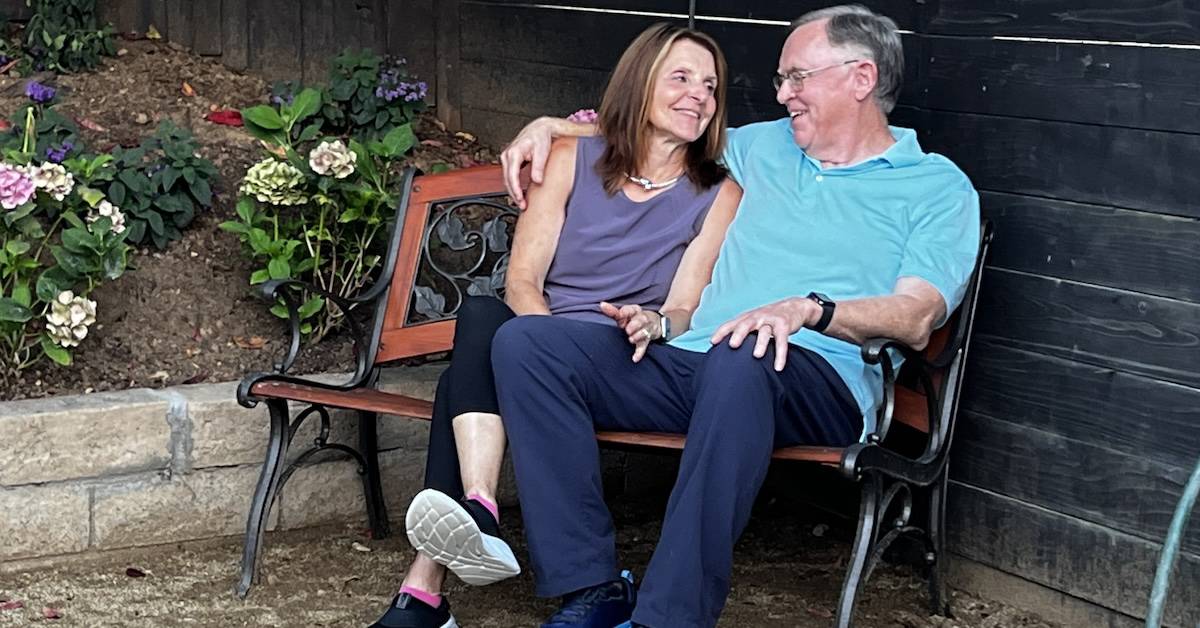


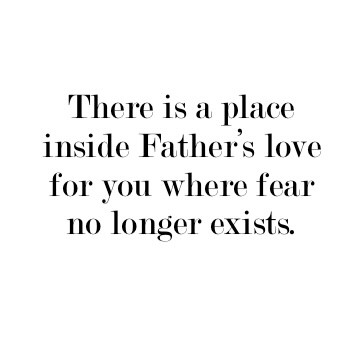 Don’t think you have to be perfect to grow here; it’s a process. When I find myself afraid, I realize there’s a way to grow in him that will consume it. It may take weeks or even months, depending how deep the fear is, but he will teach you so much about yourself and him that you will notice it bearing fruit in many other areas of your life as well.
Don’t think you have to be perfect to grow here; it’s a process. When I find myself afraid, I realize there’s a way to grow in him that will consume it. It may take weeks or even months, depending how deep the fear is, but he will teach you so much about yourself and him that you will notice it bearing fruit in many other areas of your life as well. 